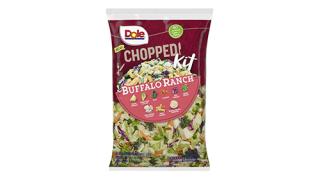News Briefs
Hiland Dairy President Shifts to Consulting Role
Gary Aggus, president of farmer-owned Hiland Dairy Foods Co. in Springfield, Mo., is exiting that role on April 1, but will continue to work for the company as a consultant. The 20-year leader propelled the dairy processor and distributor to new growth over the years, expanding from six plants in three states to 19 plants and 64 distribution centers in 10 states and helping to boost revenues from $400 million to $2 billion.
Aggus joined Hiland Dairy in 1984 as a district sales manager. He was named president in 2003 and promoted to COO and president of Joint Ventures of Prairie Farms Dairy in 2006. During his tenure at Hiland Dairy, Aggus oversaw the acquisition of other dairy brands. Those moves, including the acquisition of Borden Dairy’s assets in Texas, fueled the dairy business’ multi-state expansion. A lifelong dairy industry professional, he served as a board member of the International Dairy Foods Association, MilkPEP, Quality Chekd Dairies, Inc., the Missouri Dairy Products Association, and as a member of the Missouri Grocers Association.
[Read more: "Organic Valley Names New CEO"]
“I am very pleased the company has achieved the nice growth it has, and I attribute that to the great employees I have had the privilege to work with the past 20 years that I have served as president,” Aggus said.
Meanwhile, Hiland Dairy has promoted Rick Beaman to the president position. Beaman has also spent his career in dairy, working for other national dairy companies before coming to Hiland in 2012. He was elevated to VP in 2014.
“Rick is a successful industry veteran that knows our company's history and culture. I am confident he will do a great job leading Hiland Dairy,” Aggus added.
Ransomware Hits Dole Operations
Dole plc has confirmed that the company was the target of a ransomware attack earlier this month.
In a Feb. 23 statement posted on its website, the company shared, “Upon learning of this incident, Dole moved quickly to contain the threat and engaged leading third-party cybersecurity experts, who have been working in partnership with Dole’s internal teams to remediate the issue and secure systems. The company has notified law enforcement about the incident and are cooperating with their investigation.”
[Read more: "Empire Co.’s Operations Impacted by IT Issue"]
Reports began circulating about inventory issues a few weeks ago, as many consumers complained that their stores were out of stock on products such as Dole’s salad kits. A Feb. 10 memo from a Dole SVP to retailers affirmed the cybersecurity issue and subsequent halt in production. That memo was later obtained and cited by CNN as it reported the breach.
Although some shoppers and stores have reported ongoing shortages, the company said that lines are running. "While continuing to investigate the scope of the incident, the impact to Dole operations has been limited,” Dole added in its statement.
Cybersecurity attacks, while infrequent, still pose a risk to manufacturers that serve the grocery industry. In 2021, beef giant JBS temporarily shuttered its plants after a major breach that caused the company to pay $11 million to hackers.
Hy-Vee Temporarily Suspends Employee Discount Due to Misuse
Following findings of fraud, Hy-Vee is discontinuing its employee discount. The grocer ended the 10% discount effective Feb. 20, though it plans to revamp and reintroduce the program in the coming months.
The program was originally launched in 2019 with specific guidelines that would allow employees and one member of their household to utilize the discount. The grocer found a significant uptick in the number of users utilizing the discount who were not living in the same household, according to a statement, in addition to other fraudulent practices and loopholes.
[Read more: "Hy-Vee Acquiring Iowa Indie North Scott Foods"]
“The discrepancies found were significant enough to signal a much broader issue that needed to be addressed immediately,” the statement said. “We are currently in the process of revamping the program with the goal to relaunch the benefit to our employees by mid-April.”
Hy-Vee stressed that it still offers one of the most competitive and comprehensive benefits packages in the retail industry, including a free Hy-Vee Plus premium membership, weekly pay, a 401(k) plan with a matching contribution, part-time insurance with an employer contribution based on eligibility, and more.
Employee-owned Hy-Vee operates more than 285 retail stores across eight Midwestern states and has a team of more than 93,000 employees. The West Des Moines, Iowa-based company is No. 30 on The PG 100, Progressive Grocer’s 2022 list of the top food and consumables retailers in North America.
Kroger Accelerates Digital Strategy With Restaurant Delivery Platform
In an effort to accelerate its digital strategy, The Kroger Co. has partnered with Olo Inc., an open software-as-a-service (SaaS) platform for restaurants that enables digital hospitality at every guest touchpoint.
Millions of orders per day run on Olo’s on-demand commerce engine, providing restaurants a single source to understand and serve every guest from every channel, whether direct or third-party. With integrations to more than 300 technology partners, Olo’s customers can build personalized guest experiences in and outside of their four walls, using one of the largest and most flexible restaurant tech ecosystems on the market, according to the company. More than 600 restaurant brands work with Olo.
[Read more: "Kroger Opens Spoke Facility in Austin"]
Now the company is expanding into grocery stores through its partnership with Kroger. The food retailer has deployed Olo’s Rails module to approximately 1,600 locations, bringing sushi and floral delivery to customers nationwide.
For Olo, enabling guests to purchase prepared foods from multi-unit grocery stores represents an emerging vertical and allows grocers to significantly expand their off-premise reach. The partnership increases Olo’s total addressable location count by almost 30,000 locations, representing almost $37 billion in annual foodservice sales.
Kroger initially kicked off its banner-wide floral and sushi delivery by partnering with DoorDash in December 2022.
Nearly half a million Kroger associates serve 11 million-plus customers daily through a shopping experience under a variety of banners. The Cincinnati-based company is No. 4 on The PG 100, Progressive Grocer’s 2022 list of the top food and consumables retailers in North America.
Publix Launches 2023 Feeding More Together Campaign
Through its recently launched 2023 Feeding More Together spring campaign, Publix Super Markets is donating nonperishable food and fresh produce to local Feeding America member food banks and pantries.
During the campaign, associates and customers can donate any dollar amount at the register, up to $1,000, to help support their food-insecure neighbors. Customer donations provide nonperishable food items needed most by area food banks and pantries.
[Read more: "Publix Opens 4th Telehealth Site in South Carolina"]
Also as part of the initiative, Publix is donating $5 million in fresh produce this spring in the company’s operating area.
“We are proud to continue our founder George Jenkins’ legacy of giving back to our communities,” said Publix CEO Todd Jones. “Through our Feeding More Together campaign, donations will be given to local food banks to help alleviate hunger for our neighbors experiencing food insecurity.”
Employee-owned and -operated Publix has more than 1,300 supermarkets and 240,000-plus associates in Florida, Georgia, Alabama, South Carolina, Tennessee, North Carolina and Virginia. The Lakeland, Fla.-based company is No. 12 on The PG 100, Progressive Grocer’s 2022 list of the top food and consumables retailers in North America.
Gov. J.B. Pritzker Launches Illinois Grocery Initiative
In a bid to support residents in rural and underserved communities and cut down on the number of food deserts, Gov. J.B. Pritzker announced the creation of the Illinois Grocery Initiative. The governor shared some details of the plan in his recent State of the State address and fiscal 2024 budget presentation.
Through this initiative, the state would invest upwards of $20 million in local communities to open or expand grocery stores in areas considered a food desert. The U.S. Department of Agriculture's Food Access Atlas reveals pockets of food deserts both in the city of Chicago and in parts of central and southern Illinois.
[Read more: "States Weigh Grocery Tax Suspension, Removal"]
“We ... need to recognize that it does no good to provide a family with more money to purchase food if they have no local grocery store to shop at,” Pritzker declared. He also noted that despite the state and local governments’ efforts to incentivize large chains to come to rural and underserved areas, some retailers eventually pull out. (Although he didn’t name a particular company, the 2022 closing of a Whole Foods in Chicago’s Englewood neighborhood attracted a lot of community, political and social media attention.)
Instead, Pritzker proposed independent grocers can fill an important void. “It’s time we return to a tried and true model — one where those communities are served by independent, local grocery stores that sell food grown by Illinois farmers,” he said.
The Illinois Grocery Initiative also includes $2 million earmarked for the purchase of healthy, nutritious food from Illinois farmers. With nearly 72,000 farms within its borders, the Midwestern state is a leading producer of soybeans and corn, and its farmers and growers also provide wheat, oats, hay, fruits, vegetables, meat and poultry.
This isn’t Pritzker’s first foray into food retailing relief. Last year, the state suspended its 1% sales tax on groceries through July 1 of this year.






